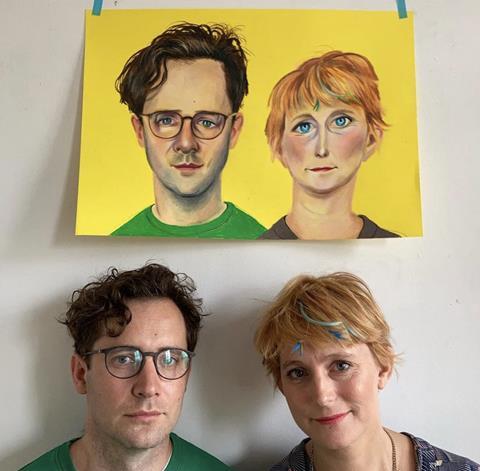
“People who haven’t played Grand Theft Auto think of it as this super-violent game. They know it through its notoriety,” says Sam Crane, co-director of Grand Theft Hamlet, which won the documentary feature jury prize on debut at SXSW this month, before its international premiere at CPH:DOX this week.
“That was me too. But it’s also beautiful, sophisticated, funny, so rich in detail. Weirdly, Hamlet is quite similar – it’s existential and brutal. It’s these two cultural beacons that are often misunderstood.”
Grand Theft Hamlet sees two actors – Crane and his friend Mark Oosterveen – put aside pandemic-induced unemployment by attempting to stage a production of Hamlet within the Grand Theft Auto online videogame world.
Crane initially made a 10-minute short called We Are Such Stuff As Dreams Are Made On of the idea in 2020. It was the suggestion of Pinny Grylls – a documentary filmmaker, Crane’s co-director and partner, and not herself a gamer – that a feature was viable. “Once I got into the game and started playing it, I thought ‘there’s cinematic potential here’,” says Grylls.
Doc Society provided a £20,000 grant for the short, with CEO Jess Search remaining a supporter of the feature until her death last summer. “A lot of people we approached couldn’t conceptualise what it was,” says Crane. “Jess said, ‘No, this is cool, we’re going to find a way to make it work.”
“She was like rocket fuel onto the project,” adds Grylls.
Grylls brought on regular collaborator Julia Ton of UK producers Project 1961, who in turn attached Rebecca Wolff of Grasp The Nettle Films. With the entire film consisting of screen recording, production costs were low; but with 200 hours of footage, an extensive editing process required financing. Search came into play again, connecting the filmmakers with US backers who could provide the money faster than UK counterparts. Partners include Oscar-nominated producer Beth Levison and Park Pictures’ Sam Bisbee as executive producers.
“US producers seemed to be more enamoured with it,” says Grylls. “It was not just to access the financing, but to think about it as a film that could play internationally – to get a stake in the ground in America,” adds Crane.
Altitude boarded world sales earlier this month. As the Grand Theft Auto series has sold over 400m units worldwide, the filmmakers hope it will have a wide appeal.
“We want it to bring communities together – people who don’t know Shakespeare to fall in love with that, and people who don’t know gaming to fall in love with that,” says Crane. “And people who don’t know either, to see this story about finding community in a tough time.”
Avatar
In the early days of production in spring 2020, the filmmakers discovered that following characters in the third-person videogame format did not make for an engaging 90-minute film. Instead, they utilised an in-game feature that allows a player’s avatar to use their phone to record what the avatar is seeing.
Grylls’ avatar became the primary cameraperson, with the production recording her feed plus those of Crane and Oosterveen to allow options in the edit.
Crane and Grylls played the game in their house, one from upstairs and the other downstairs. Capturing clear sound from players joining the online space from around the world proved tricky, which contributed to an authentic in-game experience, says Crane. “It’s not perfect audio quality; it reflects the sonic aesthetic of playing the game.” Eventually, several high-quality sound recordings were downgraded slightly for consistency.
Rockstar Games produces and owns the GTA franchise; the company was “really supportive” of the film from the very beginning, says Crane. “It showed what the game could be used as. They always see it as more than just a game; it’s a sandbox you can exist in.”

“Performing Shakespeare in the game is like when actors would’ve performed at the Globe – someone would throw an apple, people would talk over it,” says Grylls. ”There would be a lot less reverence; I like that we’ve gone back to the original performances.”
Accessibility was a key tenet of the project. Grylls is hard of hearing, and edited with a special hearing aid and live captions; while captions are hard-coded into every copy of the film. “Gaming is accessible for people with disabilities, which I love – anyone can jump into a game and make a film about it,” says Grylls. “And anyone can take part in a Shakespeare production taking place in there – which they might be prevented from doing in real life,” says Crane.
Crane has acting credits in Napoleon, BBC series The Trial Of Christine Keeler and The Crown; while Grylls won awards with her debut short doc Peter And Ben in 2008, and co-founded Birds Eye View Film Festival in 2003.
Next up, Grylls is working on her fiction feature debut Hear My Voice, a musical comedy about a young boy growing up in Hackney who dreams of being an opera singer; she is partnering with producer Ton again, with the BFI developing the project and recently funding a first draft of the script. Crane will return to acting, with “a really interesting job” coming up on a Swiss-French co-production.






![The Brightest SunScreen[Courtesy HKIFF]](https://d1nslcd7m2225b.cloudfront.net/Pictures/274x183/3/5/0/1448350_thebrightestsunscreencourtesyhkiff_312678.jpg)


















No comments yet